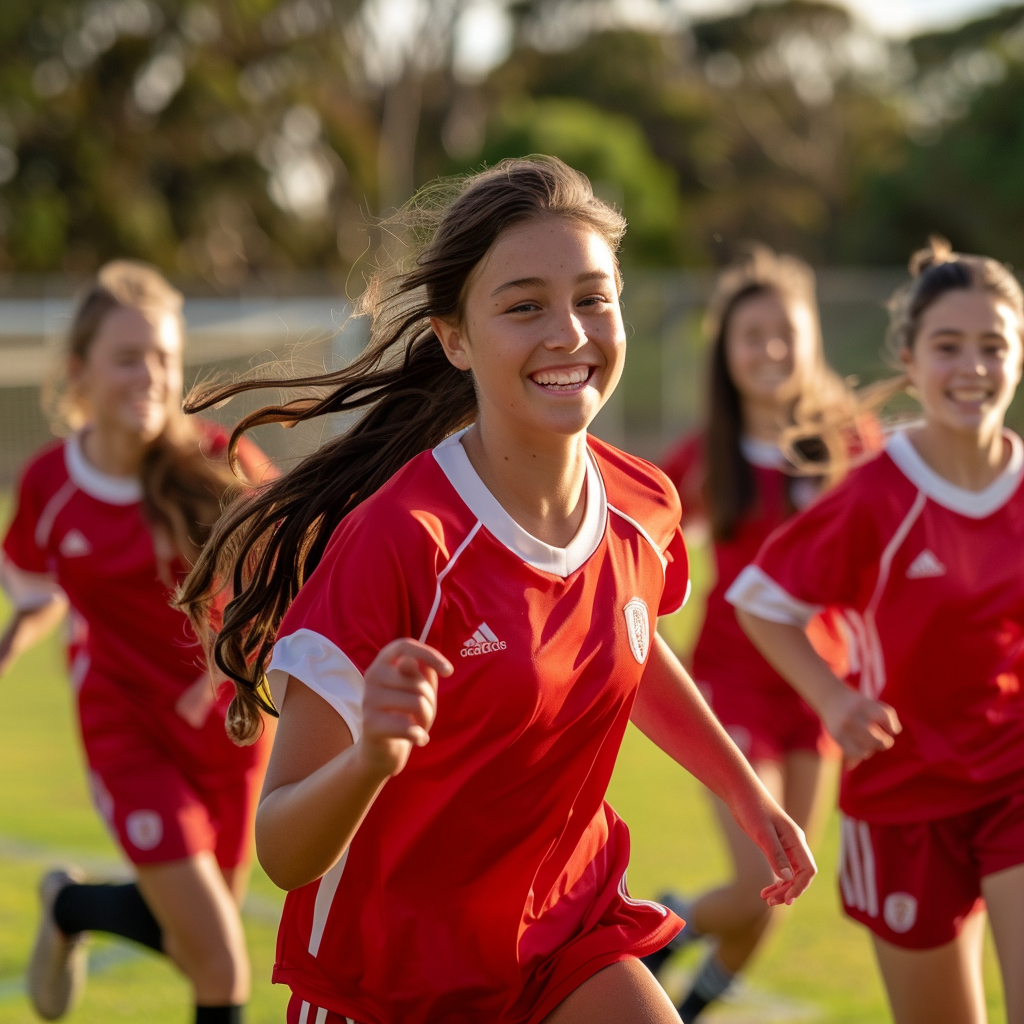 There’s a growing and concerning trend within the world of youth sports that is gaining momentum with each passing season.
There’s a growing and concerning trend within the world of youth sports that is gaining momentum with each passing season.
More and more kids are bidding farewell to their favorite sport/physical activity, leaving behind the fields, courts, and arenas where they once participated. The reasons for this mass exodus are multifaceted, ranging from parental pressure to the demanding time commitment and rigid scheduling.
While these pressures and heavy time commitments have been longstanding contributors to the decline in youth sports participation, the rise of social media platforms has introduced an entirely new set of challenges, most notably affecting young girls.
In a society where filtered selfies, the perception of perfection, and viral fitness trends dominate our screens, it’s no wonder that children, especially girls, are grappling with distorted self-images and unrealistic expectations, both in terms of how they should look and how they should perform in their chosen sports.
In fact, according to the Women’s Sports Foundation (2023), high school female athletes have more body image issues than non-athletes and have reported that they are “made fun of” significantly more than male athletes in a high school environment. These factors, combined with the enduring stigma surrounding the perceived abilities of girls versus boys in sports, are causing female athletes to drop out in large numbers across the nation.
It’s important to uncover the various reasons behind the concerning trend of kids quitting sports, and explore the heavy burden of competition, burnout, and the overwhelming aspects of parental pressure. Furthermore, we need to shed light on the profound effects of social media, which, combined with these other factors, often makes the sports field seem like a less inviting and more daunting place for our youth compared to the ease of scrolling social media and playing video games.
Parental Pressure, Competition, and Specialization
About 70 percent of young athletes leave organized sports by the time they hit middle school simply because they are no longer having fun, according to research from George Washington University Milken Institute School of Public Health.
So, what is pushing this dropout dilemma to epic proportions?
One of the most common themes amongst children and teens who have opted out of sports programs is parental pressure. While parents may feel that they are motivating their children to succeed through high demands on time and effort, the opposite may in fact be true.
According to Robert T. Muller (2015), overbearing sports parents not only manage to decrease their child’s self-esteem through focusing on what “could have been better” but also often send their kids into a whirlwind cycle of injury and recovery by pushing them to return to practice before they are fully healed.
In addition, young athletes report feeling overwhelmed by the pressure to focus on one sport (specialization) and win in competition. What may have started out as a fun weekend activity has become a daily inundation of practice and focus for many children who participate in sports.
“According to Frank Smoll, Professor of Psychology at the University of Washington, parents play a pivotal role in determining whether a sport is a fun learning experience or a nightmare. Smoll calls it “frustrated jock syndrome” when parents attempt to relive their own past successes.
Smoll’s research found that children respond most favorably, not to coaches and parents who punish undesirable behaviors, but to those who sincerely reinforce behaviors that are desirable” (Muller, 2015).
 This means that instead of focusing on the missed hit or the flubbed tackle, parents must draw attention to what their child has done correctly. As children look to their parents for validation and praise, they will flourish when focus is brought to the positive rather than the negative (Muller, 2015). While hard work and dedication should be applauded, the emphasis must be on the effort made, not the result.
This means that instead of focusing on the missed hit or the flubbed tackle, parents must draw attention to what their child has done correctly. As children look to their parents for validation and praise, they will flourish when focus is brought to the positive rather than the negative (Muller, 2015). While hard work and dedication should be applauded, the emphasis must be on the effort made, not the result.
On the flip side, many sports programs have integrated a “participation trophy” mindset where children receive accolades and positive reinforcement for lack of effort. This is just as damaging to one’s self-esteem and discourages the athletes who are willing to put in the work only to receive the same recognition.
Intense pressure in youth athletics doesn’t only negatively impact a child’s sports experience—it can also taint other aspects of their life, says Justin Ocwieja, youth developmental director of the Nationals Genesee Soccer Program in Michigan. “When parents make the sport seem like work, the child is going to look at it the same way and likely push away from the developmental process,” says Ocwieja.
It’s also important to note that when such strong emphasis is made upon winning/competition, children often associate that in other areas of life as Ocwieja mentioned – excelling academically, in relationships, etc. When challenges arise in these areas, children often don’t know how to deal with adversity and can often crumble under the pressure of NOT winning/excelling.
Furthermore, it is not uncommon to see children’s self-worth become associated with their specialized sport—not their overall life. “This can also cause injury and burnout down the line”, says Ocwieja. “I’ve seen burnout more in the older age groups, like 12 to 13 years old, because they started specializing in one sport at a young age.”
Perhaps most importantly, when parents become overbearing in relation to their child’s sport/activity, children are not able to benefit from the inherent characteristics of teamwork, cooperation, and building self-esteem and confidence through the development of skill within their sport. As more pressure to succeed becomes evident, the motivation to continue often wanes and can eventually completely diminish.
Parents should maintain a constant awareness of their child’s emotional well-being and actively initiate conversations to understand their children’s feelings. As parents, our role is to provide the support and reassurance that our kids require, not to act solely as their coach. It’s important for parents to recollect that their child’s sports journey initially began as a source of enjoyment. To sustain their interest and motivation, it’s vital to ensure that the essence of ‘fun’ remains an integral part of their sports experience.
Social Media and Perception Bias
As the influence of social media continues to expand in our lives, it’s imperative that we heighten our awareness of the consequences of the content children encounter and how it shapes their self-perception and their understanding of the world.
According to US News and World Report (2023), in a preliminary study of 70 kids who played — or used to play — sports, researchers found that some had quit because they thought they didn’t have the “right” body for the activity… and most got that idea from media images, including TikTok and Instagram posts.
Overall, the study found girls were much more likely to have quit sports than boys: Over 35% had, compared with 10% of boys. Girls also tended to have more body image concerns, with close to half saying they “looked worse than the ideal” (US News and World Report, 2023).
Erin McTiernan, a pediatric psychologist at Nationwide Children’s in Columbus, Ohio, said kids can easily fall into the trap of unknowingly comparing themselves to unrealistic — often heavily filtered or edited — images of faces and bodies on social media (US News and World Report, 2023).
While some parents may feel that these statistics are dramatic or inapplicable, it’s important to note that many children don’t discuss these perceptions with their parents or even their friends. It may appear that they are unaffected but in reality, are struggling in an internal battle with what they feel they “should be”.
As we have mentioned, it’s vital for parents to engage in meaningful conversations with their children about social media perception, bias, and how it applies (or doesn’t apply) to them. McTiernan recommends discussing who your child follows on social media, and why…and take the time to explore social media with them and help them put the content in real-life context. These conversations may open the door to a fuller comprehension of unrealistic expectations and can provide parents with a gateway to repair any body image issues or concerns.
The BTA Difference
What are the goals when you put your child into a sports program?
Often, it’s physical activity. Physical activity is one of the primary goals that parents have but also teamwork and socialization – shortly followed by work ethic, discipline, and the development of self-confidence.
Our online martial arts program is not only flexible, but it is also self-paced. We recognized that many students were losing their vigor as they were pressured to excel in sports, and we devised a curriculum that is self-guided.
Students can view their journey from white to black belt at any time, erasing ambiguity and the stress of upcoming expectations. In addition, they have the freedom to work in areas where they feel challenged and move through the areas they have learned quickly. This prevents feeling left behind on lessons that need more work or becoming bored with lessons that have already been completed.
We also understand the stressors of perception and how personal expectations can either motivate or deflate. Because we are online, our students can train in the privacy of their own home. There are no concerns about “living up to” anyone else, or the chance that your child might feel embarrassed or hesitant in front of their teammates. The flexibility and privacy that our online program offers are unparalleled in the world of youth sports, and our individualized training programs lead the competition with proven success.
Check out our blog where we discuss the research on why training at home is more successful!
 In an environment where kids are increasingly stepping away from the sports they once loved, it’s our collective responsibility to understand the factors contributing to this trend and, more importantly, to seek solutions that rekindle their passion for physical activity.
In an environment where kids are increasingly stepping away from the sports they once loved, it’s our collective responsibility to understand the factors contributing to this trend and, more importantly, to seek solutions that rekindle their passion for physical activity.
The relentless pressure to succeed, the possibility of burnout, and the overwhelming influence of social media – in particular, social media’s impact on young people, distorting their self-perception and expectations – has cast a dark shadow over the sports field.
But there’s hope on the horizon. As parents, it’s crucial to maintain open lines of communication with our children, to gauge their feelings and provide the necessary emotional support. We must remember that sports, at their core, are meant to be enjoyable experiences for kids. The pursuit of fun should be a guiding principle to keep them engaged and motivated.
At our online martial arts program, we understand these concerns. We’ve designed our curriculum to offer flexibility and self-pacing, ensuring that children and parents don’t have to grapple with unrealistic expectations or overwhelming performance pressure. We foster an environment where kids can regain their love for physical activity, learn valuable life skills, and grow both physically and mentally without the burdens that often accompany traditional sports.
By recognizing the root causes of the dropout dilemma and embracing a more balanced, inclusive, and supportive approach, we can ensure that our children continue to find joy, empowerment, and growth in sports. Together, we can help them stay on the path of personal development, fostering their love for sports as a lifelong journey.
References
Anagnost-Repke, A. (2023). We Need to Stop Pressuring Kids to be the Best at their Sport. Parents Magazine. Retrieved from https://www.parents.com/fun/sports/we-need-to-stop-pressuring-kids-to-be-the-best-at-their-sport/
Muller, Robert T. (2015). Parental Pressure Takes a Toll on Young Athletes. Psychology Today. Retrieved from https://www.psychologytoday.com/us/blog/talking-about-trauma/201511/parental-pressure-takes-toll-young-athletes
US News and World Report. (2023). Teens are Quitting Sports as Social Media Ups Body Image Concerns. Retrieved from https://www.usnews.com/news/health-news/articles/2023-10-20/teens-are-quitting-sports-as-social-media-ups-body-image-concerns






